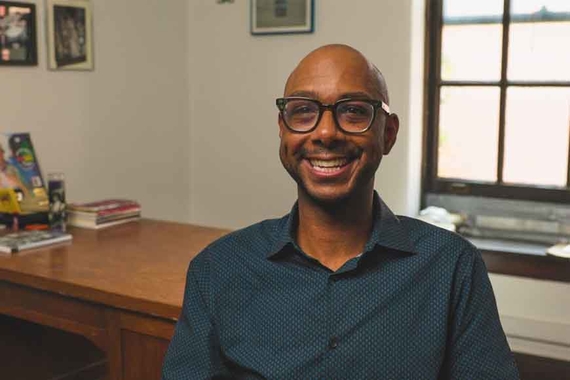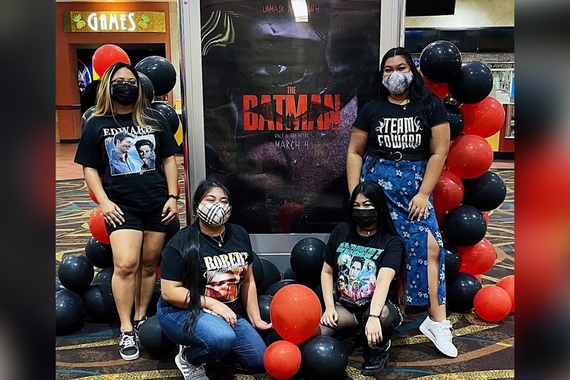Profile: Joseph Bauerkemper
Joseph Bauerkemper earned his PhD in 2008 with his dissertation Narrating Nationhood: Radical Histories in Native Fiction. He is currently a faculty member in the American Indian studies department at the University of Minnesota-Duluth. Before joining the UMD faculty, Joseph enjoyed one year at the University of Illinois as a Chancellor's Postdoctoral Fellow in American Indian studies, followed by two years at UCLA with concurrent appointments as an Andrew W. Mellon Postdoctoral Fellow in the program for the study of Cultures in Transnational Perspective and a visiting assistant professor in the Department of English. He is a 2015 recipient of the UMD College of Liberal Arts Award for Excellence in Teaching and a 2014-15 co-recipient of the Minnesota Historical Society Legacy Grant.
What brought you the University of Minnesota? What drew you to your chosen field? What do you love about what you do?
I came to UMTC's American studies program because of the collective of students and faculty gathered there. While at the time I didn't have an altogether clear sense of academia, I was drawn to the intellectually and publicly engaged community sharing Scott Hall. I was further drawn into the field of Indigenous studies because of the fundamental and fruitful challenges that it poses in both the realm of ideas and the realm of action. On this continent (among others) we are all fully immersed and variously implicated in settler colonialism. Indigenous studies illuminates this in order to imagine and pursue otherwise. As my work increasingly emphasizes scholarly outreach, I am abundantly grateful to play thoroughly modest roles in improving Native-settler relations and governance.
How have your experiences at UMN prepared you for what you are doing now? How have they influenced your teaching, mentorship, research, or other pursuits?
My experiences in the American studies doctoral program provided me with many of the ongoing relationships that remain at the heart of my learning, teaching, and scholarship. The version(s) of American studies that I encountered and embraced at UMTC prepared me to make use of diverse sources and methods in order to address questions of great interest both within and well beyond academia. Most of my current teaching serves Native students working toward applied professional degrees in governance, and because of my time at UMTC I am able to foster students' intellectual curiosity and capacity in ways that significantly impact their approaches to professional and public service opportunities. My commitments to both the necessity of applied education in Indigenous studies and to the critical engagements of the field were deeply enabled and informed by my own graduate training.
What fond memories do you have from your time as a UMN graduate student? What do you miss about being on campus or living in the Twin Cities?
Thinking back, I appreciate the seasons of grad school life in which my primary attention and labor would shift across weeks and months between seminars, papers, teaching duties, exams, research, reading, writing, and community engagement variously. I'm not a terribly effective multi-tasker, and—at least in retrospect—the rhythms of doctoral study suited me rather well. I recall with both thankfulness and regret the endless research resources available on the UMTC campus and the immense community of generous scholars in residence there. While I don't imagine that I could have realistically taken much better advantage of them, there were no doubt numerous archives, supports, and potential relationships that I failed to adequately appreciate. My point here is that graduate students at UMTC are provided with a humbling wealth of access and opportunity. I must note with expansive gratitude that I did benefit immensely from exceptional resources such as the American Indian and Indigenous Studies Workshop and from the kind generosity of David Noble, Carol Miller, Jeani O'Brien, Brenda Child, Rod Ferguson, David Chang, and many others.
How has your intellectual life evolved since you graduated? What projects are you currently working on?
My scholarship and teaching have always been inextricably intertwined, and they both have become increasingly governance-oriented and applied in nature. While I continue to deploy modes of analysis associated with literary studies and the history of ideas, I am more and more often doing so in consideration of treaty rights and obligations, tribal governance development, and settler law and policy contexts. A current project in this vein looks at Native-run non-governmental organizations that tribal nations partner with to develop court systems, governance capacity, and enhanced jurisdiction.
What advice do you have for current graduate students in your field?
Live kindness, gentleness, and toughness. Seek out numerous reliable mentors of various perspectives and humbly accept their collective guidance (though not, of course, without reflection). Know the contributions you are making and the contexts into which you are making them. Create and embrace opportunities at hand while trying not to get too invested in abstract conventional pathways. Take note of luck—yours and that of others.
What books or blogs have you been reading recently? Any recommendations for our readers?
Carter Meland's Stories for a Lost Child
Sarah Deer's The Beginning and End of Rape
Joanne Barker's "Tequila Sovereign"
anything and everything by LeAnne Howe



